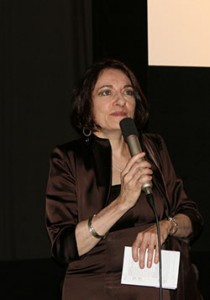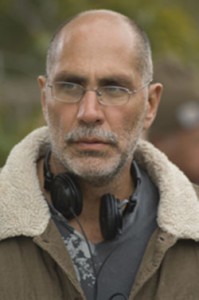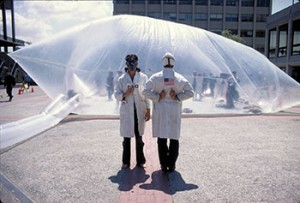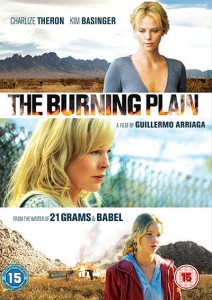THE HOME MOVIE ARCHIVE LIVE
A talk by Patricia Zimmerman
12:00 p.m. Knight Library Proctor 41 FREE
 Home movies are often positioned as dead, inert, ghostly, decayed. Scholars of home movies position them as evidentiary and referential. This talk proposes an opposite, almost counterintuitive move towards “live;” it ponders how the home movie archive “live” can function proactively to generate new spaces through performance and the performativity of remix.
Home movies are often positioned as dead, inert, ghostly, decayed. Scholars of home movies position them as evidentiary and referential. This talk proposes an opposite, almost counterintuitive move towards “live;” it ponders how the home movie archive “live” can function proactively to generate new spaces through performance and the performativity of remix.
Once home movies are recovered and deposited in archives, a default position emerges: their acquisition is all that matters. The thing itself—the celluloid reels, metal cans, deteriorating color—become more and more fetishized as fixed representations. Instead, the home movie artifact can be repositioned as open and active, no longer a mortuary of nostalgic historic images shrouded in longing, desire, and quaintness. Archival remix projects with live music, installations requiring walking, shows in clubs with multiple projections on walls, and guided bus tours with home movies on monitors chart the shape-shifting landscapes of the home movie archive live. The archive is re-imagined not as a product but as a process, not as a place but as an encounter, not as a representation but as a collaborative, dynamic space.
Patricia R. Zimmermann is professor of Screen Studies in the Roy H. Park School of Communications at Ithaca College and is the author of Reel Families: A Social History of Amateur Film (Indiana, 1995), States of Emergency: Documentaries, Wars, Democracies (Minnesota, 2000), and coeditor of Mining the Home Movie: Excavations in Histories and Memories (California, 2008).
RUINS IN RECENT INDEPENDENT CHINESE CINEMA
An illustrated lecture by Berenice Reynaud
2:00 p.m. Global Scholars Hall 123 FREE
 The emergence of the New Chinese Cinema has been one of the most exciting events in the last decade, as it is exploring new ways to represent a society in which billions of inhabitants are submitted to radical and unexpected changes. A new generation of filmmakers (including Wang Bing, Jia Zhangke, Ou Ning, Cao Fei, Ying Liang, Cui Zi’en) are creatively using digital media to coin hybrid forms between documentary and fiction. This presentation will discuss how this new cinema is addressing an overwhelming phenomenon currently taking place in China, the production of ruins as part of planned urban renewal. The spectacle of such ruins is caused by a variety of historical and sociological factors, including the general shift from heavy industry to service industry, the construction of the Three-Gorges Dam, and the preparation for the Olympics in Beijing and World Fair in Shanghai.
The emergence of the New Chinese Cinema has been one of the most exciting events in the last decade, as it is exploring new ways to represent a society in which billions of inhabitants are submitted to radical and unexpected changes. A new generation of filmmakers (including Wang Bing, Jia Zhangke, Ou Ning, Cao Fei, Ying Liang, Cui Zi’en) are creatively using digital media to coin hybrid forms between documentary and fiction. This presentation will discuss how this new cinema is addressing an overwhelming phenomenon currently taking place in China, the production of ruins as part of planned urban renewal. The spectacle of such ruins is caused by a variety of historical and sociological factors, including the general shift from heavy industry to service industry, the construction of the Three-Gorges Dam, and the preparation for the Olympics in Beijing and World Fair in Shanghai.
Significantly, a number of new Chinese films articulate how the ruins address the spectator, directly or indirectly, and reshuffle tropes of historical/architectural memory and nostalgia. Excerpts from films by Jia Zhangke, Ou Ning, Ying Liang, Wang Bing, and others will be shown.
Bérénice Reynaud is the author of Nouvelles Chines, nouveaux cinémas (Paris, 1999) and Hou Hsiao-hsien’s A City of Sadness (London, 2002). She has written extensively on Chinese cinema and video, US independent/experimental cinema, queer cinema and cinema by women for Sight & Sound (UK), Film Comment (USA), Cinema Scope (Canada), Senses of Cinema (Australia), Cahiers du cinéma, Le Monde diplomatique, Libération (France), Meteor, Springerin (Austria), and Nosferatu (Spain), among others. A Delegate for the San Sebastian International Film Festival (Spain) since 1993, she has also curated film/video series for the Galerie Nationale du Jeu de Paume (Paris), the Museum of Modern Art (New York), and the UCLA Film & Television Archive (Los Angeles), and is Co-Curator for the film series at the Roy and Edna Disney/CalArts Theater (Los Angeles). Reynaud teaches at the California Institute of the Arts.
The Bartolome de las Casas Lecture in Latin American Studies
THE U.S.-MEXICAN BORDER THROUGH THE LENS OF A WRITER
 A lecture by Guillermo Arriaga
A lecture by Guillermo Arriaga
4:00 p.m. JSMA Lecture Room FREE
Writer and director Guillermo Arriaga discusses the influence of border issues on his work. Arriaga is renowned for his fragmentary, nonlinear narratives that connect characters across national borders, most notably in the “death trilogy” he wrote and Alfonso Inarritu directed: Amores Perros, 21 Grams, and Babel. Arriaga’s The Three Burials of Melquiades Estrada, directed by Tommy Lee Jones, deals directly with the tensions on the U.S.-Mexican border, a terrain that Arriaga has known well since his childhood. He believes that the border between Mexico and the United States is filled with stories of love and friendship, of violence and cruelty, of hope and desire, and of redemption and criminality. The humanity of these stories can be lost when analysis is done from afar and in the aggregate, rather than from the empathetic position of the storyteller.
ANT FARM: THEN AND NOW
A lecture by Chip Lord
6:00 p.m. UO Willamette Hall 100 FREE
 The group Ant Farm created a radical architectural practice during the decade 1968- 1978. This lecture by Ant Farm’s co-founder Chip Lord revisits a number of those seminal works as well as presenting recent projects. Ant Farm Media Van v.08 [Time Capsule] stands as a project that both looks back to the 1970’s as a video archive and forward to the future via a digital time capsule for the year 2030. House of the Century, Cadillac Ranch, Media Burn, and Ant Farm’s legendary “inflatables” will be presented along with Convention City, 1976.
The group Ant Farm created a radical architectural practice during the decade 1968- 1978. This lecture by Ant Farm’s co-founder Chip Lord revisits a number of those seminal works as well as presenting recent projects. Ant Farm Media Van v.08 [Time Capsule] stands as a project that both looks back to the 1970’s as a video archive and forward to the future via a digital time capsule for the year 2030. House of the Century, Cadillac Ranch, Media Burn, and Ant Farm’s legendary “inflatables” will be presented along with Convention City, 1976.
THE LOVE SONGS OF TIEDAN
With guest speaker Berenice Reynaud
6:30 p.m. Bijou Art Cinemas
Tickets: $6 sr/stu; $8 general
A larkish tribute to the er ren tai form of bawdy folk singing practiced for centuries in director Jie Hao’s home in the northwestern mountainous region of China, The Love Songs of Tiedan (Mei Jie) is shot in a dirt-poor village in this region and acted mostly by native nonprofessionals.
The temporary prohibition of er ren tai is just one obstacle that our hero Tiedan (Feng Si) must cope with. As a child, the precocious Tiedan becomes deeply attached to er ren tai-singing neighbor Sister May. As an adult he ends up having various romantic complications with all three of her children—identified only as First Daughter, Second Daughter, and Third Daughter. Sister May is the pupil and the singing partner of Tiedan’s father, a man so devoted to er ren tai that he will get into serious trouble during the Cultural Revolution for practicing a “feudal” form of entertainment. Sister May has a boorish husband who begets her three daughters, claims her as she is hiding in Tiedan’s parents house, and eventually takes her on the other side of the mountain to the Mongolian border.
Director Jie Hao focuses on male desire as in his debut, Single Man, a film that earned him an international reputation as one of China’s most exciting new independent directors. But The Love Songs of Tiedan, according to visiting critic Berenice Reynaud, draws from a broader “range of cinematic and visual styles from ethnomusicology to musical to comedy to expressionism.” Hao also pushes the envelope of romantic longing and erotic obsession much further than in his previous work.


THE BURNING PLAIN
With Guillermo Arriaga
9:15 p.m. Bijou Art Cinemas
Tickets: $6 sr/stu; $8 general
Critically acclaimed Mexican screenwriter Guillermo Arriaga (Babel, Amores Perros, 21 Grams) made his directorial debut with The Burning Plain (2009), set and largely filmed in Portland, Oregon. At the Venice Film Festival where it premiered, the film received a standing ovation and the Marcello Mastroianni Award for, in her first featured role, an eighteen-year-old actress named Jennifer Lawrence. Lawrence’s audition tape blew away the film’s executive producer and star, Charlize Theron, when Arriaga brought it to her.
Three years after the film’s release in the U.S., where it fared less well commercially than it did in Europe, Arriaga returns to Oregon for a series of screenings hosted by the University of Oregon’s Cinema Pacific Film Festival. Maybe Arriaga’s eloquent presence, or the chance to see Best Actress Jennifer Lawrence pre-Hunger Games and Silver Linings Playbook, will encourage you to take a second look at this strong and neglected work.
As usual with Arriaga, the film is an ensemble drama following several characters in different times and places. Here, the characters are an Oregon woman trying to reconcile with her mother after a traumatic childhood; two teenagers trying to save their parents in a New Mexico border town; a young girl on a journey of redemption; and a couple dealing with their extramarital affair. Sylvia (Charlize Theron), Mariana (Jennifer Lawrence), and Gina (Kim Basinger) are the central female characters who suffer from damaged pasts.
With filming locations mostly in Oregon and New Mexico, the film is beautifully shot by the great cinematographer Robert Elswit (There Will Be Blood). Arriaga’s intricate writing weaves together the intercut storylines in a continuously dramatic fashion. The Burning Plain’s fragmented approach to storytelling may require viewers to put the pieces together themselves, but this work is amply rewarded.

